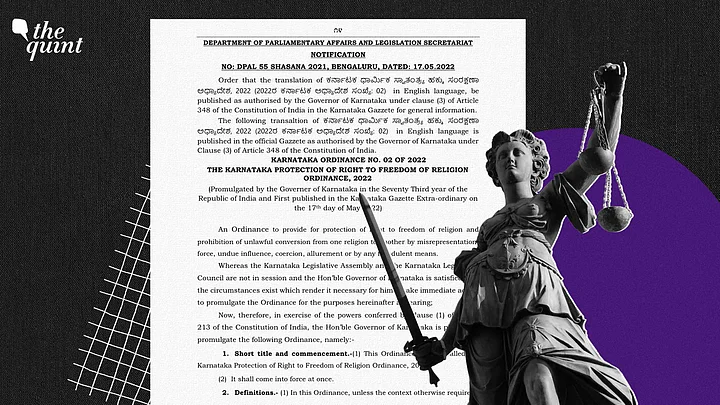The Karnataka Legislative Council passed the Protection of Right to Freedom of Religion Bill, 2021, or anti-conversion bill, by a voice vote on Thursday, 15 September. However, the Congress staged a walkout while the bill was being tabled.
Leaders of both the ruling party and the Opposition have been debating this bill in the upper house since Thursday afternoon. Earlier, the bill was passed in the Assembly amid similar opposition from the Congress and the JD(S).
Anti-Conversion Bill Passed After a Long Debate
Law minister JC Madhuswamy said the anti-conversion act was only restricted to forceful conversions and not religious conversions made by individual’s choice.
Speaking on the floor of the upper house, the minister said, "We haven't made any amendments to the bill which can prevent conversion by choice. Instead, amendments have been made to ensure forceful conversions stopped. We are passing this bill to protect religion and faith. We are not obstructing anybody’s personal choice.”
On the contrary, Congress MLC Nagaraj Yadav termed religious faith a "private matter" and that conversion was a person's right of choice. Last year, the bill was passed in the Assembly and promulgated as an ordinance. But, it was not introduced in the upper house as the BJP lacked clear majority.
While, tabling the the controversial bill, home minister Araga Jnanendra claimed that the in the recent years, conversion of faith was being done coercively and not by one's choice. Addressing the council, he said, "There is unrest across the country, as forceful conversions are being done en-masse."
Backing the home minister, chief minister Basavaraj Bommai alleged that in the name of religion, terror was being unleashed in Karnataka. "They are brainwashing innocent people and indulging in vehemently indoctrinating radical thoughts among weaker sections of the society," he added.
Responding to claims made by the members of the BJP government, leader of the Opposition in the Council, BK Hariprasad asserted that there was difference between spirituality and religion, and that the BJP was using religion to spread hate in society.
"One must also understand why there are conversions happening today," said BK Hariprasad. Tearing the copy of the bill in protest, the Congress leader also termed the bill as "unconstitutional" and claimed that it would affect the individual's right to religion.
Meanwhile, law minister JC Madhuswamy maintained that the bill was well within the scope of the Constitution of India.
"The Supreme Court could give a jail term of three to five years with a fine of Rs 25,000 to those violating the law from general categories. The law also says that those trying to convert minors, women and people from the SC-ST community forcibly will be given a jail term of 10 years with a fine of Rs 50,000."JC Madhuswamy, Law Minister, Karnataka
With the passage of the bill in Karnataka Legislative Assembly and Council, the state became the ninth in the country to have passed or implemented anti-conversion law.
As of now, the act protects right to freedom of religion and prohibits unlawful conversion from one religion to another by force, influence or even allurement.
Meanwhile, the anti-conversion act has been severely criticised by the opposition leaders, activists, heads of religious minority groups and social activists, who have claimed that it is adverse towards democratic ideals and the constitution.
